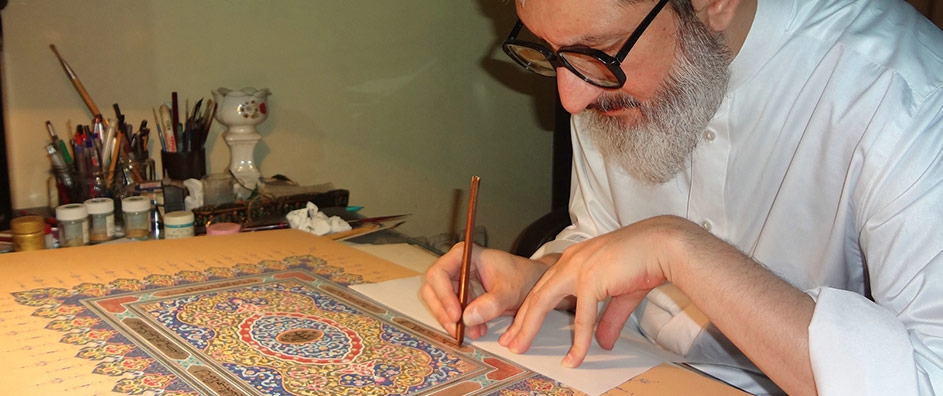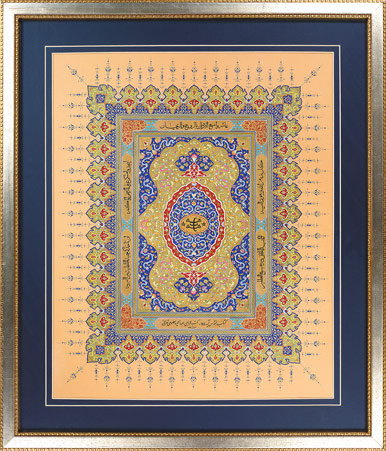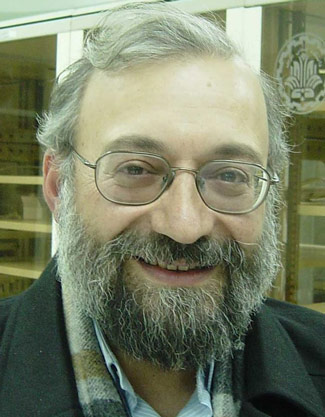The views expressed in our content reflect individual perspectives and do not represent the authoritative views of the Baha'i Faith.
During this past week a few positive news reports from around the world seemed to indicate a potential shift in the ongoing persecution of the Baha’i Faith and its adherents in Iran.
A senior Iranian cleric, Ayotollah Abdol-Hamid Masoumi-Tehrani, presented an artistically-illuminated calligraphic rendering of a passage from the writings of Baha’u’llah to the Baha’is of the world, in an unprecedented gesture of solidarity and sympathy for the persecuted Baha’is in his country.
In a statement that accompanied his heartfelt gift, the Ayotollah said, “I have made this as an enduring symbol of respect for the innate dignity of human beings, for fellow-feeling and peaceful coexistence regardless of religious affiliation, denomination or belief. And now at the start of this new year 1393 (2014) I present this precious symbol—an expression of sympathy and care from me and on behalf of all my open-minded fellow citizens who respect others for their humanity and not for their religion or way of worship—to all the Baha’is of the world, particularly to the Baha’is of Iran who have suffered in manifold ways as a result of blind religious prejudice.”
Religious leaders from many Faiths around the world responded with hope. The Bishop of Coventry and the Church of England’s lead bishop on foreign policy, Dr. Christopher Cocksworth, said “I’m heartened to learn of the recent decision by Ayotollah Abdol-Hamid Masoumi Tehrani to gift to the Baha’is an illuminated calligraphic work from the writings of Baha’u’llah, the founder of the Baha’i Faith. Given the systemic and long-standing suffering experienced by the Baha’i community in Iran, this is an imaginatively courageous step by a senior Iranian Islamic scholar.”
Also, the International Campaign for Human Rights in Iran reported that Javad Larijani, Head of the Iranian Judiciary’s Human Rights Council, admitted that the Baha’is in Iran are entitled to full and equal constitutional rights.
“Iranian officials, most notably Javad Larijani, have often made similar statements to foreign audiences, claiming that the persecution and prosecution of Baha’is is not due to their faith. However, inside the country, they typically refer to the Baha’is in degrading and inflammatory terms, calling them a cult and accusing them of being agents of foreign powers. They infer that Baha’is should not enjoy equal constitutional protections.
“The acknowledgment to their domestic audience that Baha’is are entitled to equal rights is evidence of a new level of domestic accountability,” the ICHRI reported, “and a clear indication that Iranian hardliners, particularly in the Judiciary, have come under increased pressure to justify their rights violations due to the recent international focus on the human rights situation in Iran.”
On April 6, 2014, in a rare interview with the Iranian Labor News Agency (ILNA), Larijani said: “The authorities never target Baha’is just because they are followers of this faith, because according to the Constitution, all Iranian citizens are entitled to certain rights and cannot be deprived of rights stipulated in the constitution.”
The ICHRI has stated that since the 1979 Revolution, the Baha’is have been one of the most egregiously persecuted minorities in Iran. The debate surrounding the citizenship rights of Baha’is reached a critical stage in December 2009 when the dissident cleric Grand Ayatollah Montazeri issued an unprecedented fatwa (an Islamic judicial edict) acknowledging the full citizenship rights of Baha’is living in Iran, on par with all other citizens. Up to that point, no major Shi’a cleric had recognized the equal rights of Baha’is as Iranian citizens.
However – these positive developments, despite the hope they’ve already generated among advocates for religious freedom, leave an enormous amount yet undone. While the Human Rights Council’s Mr. Larijani did acknowledge the constitutional rights of Baha’is, he also continued to claim that no Baha’is are prosecuted and imprisoned due to their faith, and that Baha’i students are not barred from access to higher education. Those false claims, all directly contradicted by extensive documentation and by the UN Special Rapporteur on Human Right’s recent report, fail to recognize the fact that Iran has arrested more than 700 Baha’is since 2004; and currently imprisons 136, including the seven Baha’i leaders known as the Yaran. Shaheed’s UN report also notes that another 289 Baha’is have been arrested, released on bail and are awaiting trail; and another 150 have been sentenced to prison terms – all for only one reason, the “crime” of being a Baha’i.
Iranian officials have frequently claimed that Baha’i prisoners and arrestees are guilty of “espionage” or unspecified “crimes against the regime,” but multiple human rights observers and the overwhelming objective opinion of the international community dismiss those trumped-up charges as completely fabricated.
The International Campaign for Human Rights in Iran, in its statement about Larijani’s remarks, said it “welcomes this step forward in domestic accountability in Iran, and urges the international community to maintain its productive focus on the situation of human rights in Iran in general, and on the situation of Baha’is in particular.”
During the past several weeks, that international focus on the deprivation of the human rights of the Baha’is in Iran has intensified. Both the UN Secretary General Ban ki-Moon and the UN Special Rapporteur on Iran Ahmed Shaheed have issued hard-hitting reports, the UN Human Rights Council has debated the situation, the United States Senate has continued preparations for its newest resolution on ending the Baha’i persecution in Iran, and the European Union’s Parliament has adopted a resolution urging Iran-EU relations to address human rights concerns.
Unfortunately, the evidence shows that the Iranian government has a long way to go before it restores the religious freedom of the Baha’is and regains its legitimacy on the global stage – but the world continues to watch for more hopeful signs.



















Comments
Sign in or create an account
Continue with Googleor